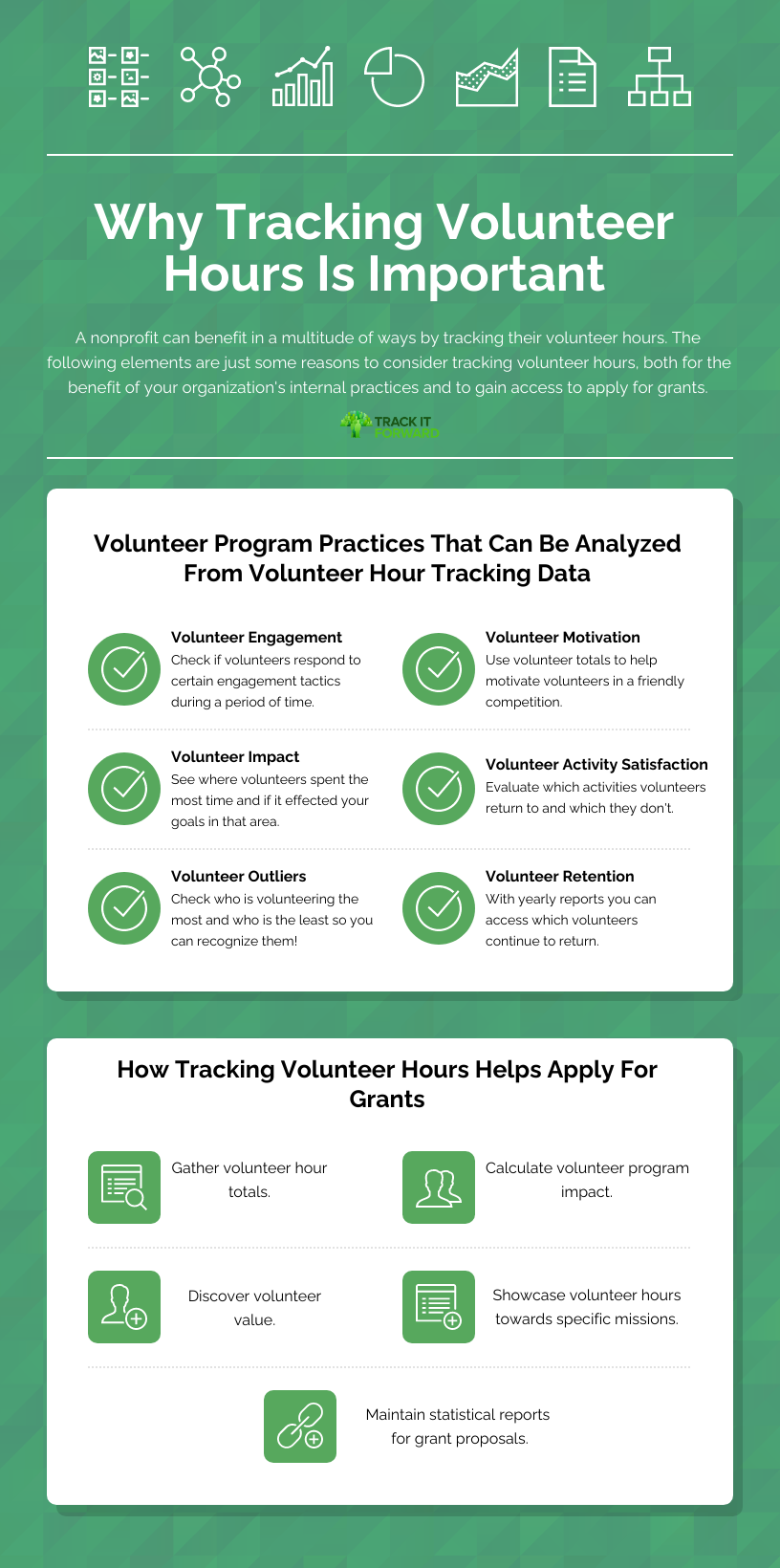Volunteers and donations are the backbone of so many nonprofits. Your organization might be in a place where you have a good flow of volunteers but are missing the mark on donations. Grants are a way to solve this dilemma of having more people than money. The good news is grants are attainable if you have the volunteer base and data to help promote your organization.
Some nonprofits actually have grants where they get money every time a volunteer volunteers. These grants, also known as volunteer grants, can be difficult to identify. You’ll need a few main components to get these grants: an understanding of different grant types, a way to keep track of volunteer hours, and an understanding of your volunteer base and where they work. Although difficult to identify, these grants are not impossible to attain!
We’ve created this mini eBook that explains all the different types of grants and how to get them. Next, you’ll need a tool to help track volunteer hours, like Track it Forward. Track it Forward can help you keep track of volunteer time, run reports, and more! Another tool we recommend to track grant match opportunities is Double the Donation. Their volunteering module can help you identify which volunteers belong to corporate volunteer incentive programs with donation matching and volunteer grants.
Why Tracking Volunteer Hours Is Important

Tracking volunteer hours is a process that proves your organization is analytical and self-reflective to donors and grant providers. If you take the time to gather reports from your volunteer hour database, this showcases that your organization is organized and passionate about making sure your volunteers are providing impact to your organization’s mission and goals.
It is important to note that tracking volunteer hours will not automatically qualify your organization’s success or grants.This will take time, implementation focus, and a mix of other good practices, too!
Make sure you are actually tracking the specific things that help highlight the areas of improvement a grant will help with.
You can learn more about what specific grants might be looking for from our mini eBook.
The Value Volunteer Hour Reports Adds to Grant Applications
You can use volunteer data to help showcase a few different things on a grant application or proposal. Here are just a few examples.
- The total amount of volunteer hours your organization had over a period of time.
Volunteer totals can show that many people are dedicated to helping your mission and cause. This will help show that money will not go to waste.
- The number of volunteer hours that went towards a certain activity.
Categorized data and volunteer hour reports showcase management and self-reflection. You are able to evaluate where the biggest volunteer impact takes place, and the grants can help these areas or the ones that are not doing as well.
- The monetary value of your volunteers’ time.
This and the number of consistent volunteers will show that your volunteer program will continue to improve and be impactful over time due to the support of volunteers.
- Volunteer hour totals in a specific time of growth.
This will help showcase the direct impact of volunteers on an organizational goal. it can also give grant reviewers a feeling of community and feel more approachable with your volunteer base due to their levels of commitment.
Specific types of grants may actually require some of this data in order to apply. If you are applying for government grants - these totals and numbers need to be absolutely accurate and traceable in order to legally be considered. Our mini eBook outlines what can happen when you aren’t totally transparent and truthful with your data.
Now that you have that baseline of what can be helpful with volunteer hour data and reports to get these grants, let’s lay out the steps for finding and applying to grants.
6 Steps to Finding and Applying for Grants that can use your volunteer hours
1. Find an effective way to track your volunteer hours
There are many different ways to track your volunteer time within your organization. It is important to remember that for grant applications and proposals your volunteer hour totals need to be accurate, so your volunteer time tracking process needs to be accurate, too.
You need to be able to showcase exactly where your volunteer hours came from and at what times. We suggest that you use a volunteer time tracking software system like Track it Forward.
With Track it Forward, you can see all volunteer hour logs, and run at least 5 different types of reports instantly to see different actions, totals, and impacts of your volunteer hours!
2. Run Reports on Your Volunteer Hours
Gather all the different totals that you can on your volunteers, their hours, and different efforts that your program focused on.
We suggest you run as many reports as possible so when you are writing your grant proposal, you can decide which statistics and data are best for the grants you are applying for.
Track It Forward provides five different reports, or more if you implement conditional logic!
The reports include an all hour report, volunteer report, volunteer & activity report, activity report, and milestone reports! Learn about the differences between these reports here.
After you run the volunteer reports, it is important that you understand the value they provide for grant applications.
3. Analyze Reports & Different Ways To Better Your Volunteer Program
After you pull the reports, look at the data and analyze them! You can find out how well you are doing as a volunteer program by looking at your milestone goals report.
You can also see when you were most interactive with your volunteer program and if that boosted volunteer participation. Or see how your volunteers might have made a direct impact on your organization during a time of peak volunteering.
4. Calculate The Value of Your Volunteers
There are a number of ways you can calculate the monetary value of volunteer time. The 2024 national average value of volunteer time is $34.79 per hour (that’s a significant increase from $27.70 per hour in 2020). For comprehensive data on the value of volunteer time across different states and over time, take a look at this useful article from the Independent Sector. To calculate the value of more specialized skills, the Bureau of Labor Statistics has wage data by area and occupation.
____________ x ____________________ = total value of volunteer time
# of hours avg. hourly rate
5. Research Different Grants You Can Get
Next step, grants! There are different types of grants, and many vary depending on the country and state that you live in, the type of organization giving out the grant, and the type of benefit that beneficiaries would receive from the grant.
In our Nonprofit Grants Explained mini eBook, we will explain different types of grants, their eligibility, and even give examples!
For now, we will just go over some of the different categories of grants based on the organization awarding the grants.
Corporate Grants and Volunteer Incentives
These grants are from large corporations and usually come in a sort of match-grant or specific grant instead of a monetary donation. For example, a large corporation will usually give out a specific thing that is related to your organization’s mission and the corporation.
Some corporations offer volunteer grants and volunteer time off (VTO) as incentives for their employees. They may donate a certain amount to a nonprofit based on the number of hours their employee volunteers, or they may offer paid time off to further incentivize employees to volunteer.
Foundation Grants
Foundation grants are large sums of money collected from philanthropic donations that are then gifted to a nonprofit organization. Different foundations are required, depending on their specific type, to give out money to nonprofits.
Foundations can be family foundations like the Bill & Melissa Gates Foundation, private foundations, public foundations, or community foundations. Each of these has a different source of primary funding.
Government Grants
Government Grants are the most regulated and legal action grants. They can be local, federal, or state grants. Since these grants come from the government and usually taxpayer money as well, there are strict qualifications and eligibility requirements that are needed to apply.
These grants are usually always monetary, whereas others might be in-kind donations. This is where the accurate and reliable volunteer hour data will come in handy to help make numeric calculations.
Federated Funds
These are donations usually made by local businesses or individuals in a fundraising effort for specific organizations!
There usually is not a huge application process for this, or you might not be expecting it at all, but if there is a federated fund that you find you need to apply for, showcasing volunteer hours will be beneficial because federated funds usually come from people who like to know they are helping out as many people as possible - which includes volunteers.
6. Get Your Volunteer Program Stats Ready to Present!
And lastly, it is time to write your grant application and proposal! Having your volunteer hour data will be helpful and might even be a requirement in some of your grant applications.
Learn more about writing a grant proposal and statement of need here. We also recommend taking this part very seriously and maybe even hiring a grant writer - or finding a volunteer one!
With or Without Grants - You Should Still be Tracking Volunteer Hours!
We aren’t going to sugarcoat it. Applying for grants is competitive and hard. Sometimes, it can just be a bit too much work. If your nonprofit is struggling to turn volunteer hours into grant and donation opportunities, this e-book is for you. Consider tools like Track it Forward and Double the Donation to save you time and headaches when it comes to tracking volunteer time and identifying grants and corporate volunteer incentives.
Tracking your volunteers and volunteer hours goes a long way, beyond applying for grants. Tracking volunteer hours allows for organizations to better visualize their impact on the community, set goals, and become accountable for them! You can help recruit and retain volunteers with volunteer data by doing fun leaderboard competitions or even awards. You can also test out which motivational methods work best for your volunteers, and see which activities get the most volunteer attention.
For more information on how Track it Forward can be used to streamline your time tracking process, see how it works!
 Last updated by
Last updated by